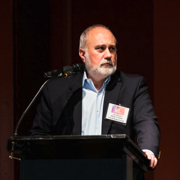Five Questions for Marc Dunbar
The self-professed gambling policy 'nerd' talks about the future of legal sports betting in Florida.

Image by Ludivore from Pixabay
Marc Dunbar likes to describe himself as “just a lawyer and a gaming nerd” – and by gaming, he means gambling. The Tallahassee attorney and adjunct law professor is much more than that, however. As both a lawyer and a lobbyist he has influenced much of the state’s gambling law and regulations for more than a decade. A shareholder in the Dean Mead law firm, he also has been named a member of Florida’s Legal Elite in Government and Administrative Law by Florida Trend.
Dunbar now represents the Seminole Tribe of Florida, which is behind the powerhouse Hard Rock brand of hotels and casinos. (He stressed before the interview that his opinions were his own, not his client’s.) A historic deal brokered with the state that allowed the tribe to offer online sports betting is on hold after a Washington, D.C. judge ruled that it was in violation of federal Indian gambling law. The owners of Bonita Springs Poker Room and Miami’s Magic City Casino filed the suit, saying among other things that the deal between the state and the tribe, called a “gaming compact,” would create a “significant and potentially devastating” effect on their businesses.
The compact was expected to bring in $2.5 billion for the state during the first five years and included allowing the tribe to offer craps and roulette at its casinos and to add three casinos on its property in Broward County. With a new state gambling control commission and some kind of gambling-related legislation expected for the 2023 legislative session that starts in March, City & State has five questions for Marc Dunbar. Questions and answers have been edited for clarity and brevity:
Will Florida ever get – perhaps we should say “legal” – sports betting back?
Yes. It's too large of a market for Florida. We are such a massive sports market in terms of our college and professional athletics. We also have a massive underground sports wagering marketplace, which is just rewarding the illegal offshore operators. The policymakers realize all that and that's why they passed the compact. So it really is a function of the policymakers figuring out what the courts will allow them to do. But we will definitely have sports wagering back. In the meantime, DraftKings and FanDuel and all the fantasy sports operators are taking wagers from Floridians … and the state's making no money off of it. It's a multibillion-dollar marketplace that the state should have some regulatory and taxing authority over.
What is the eventual resolution going to look like?
I think what will happen is you're going to have a marketplace that is competitive. What “competitive” means really depends on what the policymakers want it to mean. … What people don't realize is sports wagering operates on razor-thin margins. And then a state comes in and says, ‘We're gonna throw a tax on top of it.’ Well, OK, that's great. What tax do you want? A New York style tax, which is 30 or 40%, or do you want a Vegas tax, which is closer to 3%? Where does that fall? And then what's left in the marketplace afterwards? And that's where the art of the policymaking comes in. … I still believe that the D.C. circuit is going to overturn what is a very flawed trial judge opinion. So I think this is going to get sent back and likely there'll be another compact in the second (DeSantis) administration, if I had to bet.
You mention DraftKings and FanDuel, which run online fantasy sports games. They’re behind a proposed state constitutional amendment that would allow sports betting without the tribe. What chance does it have getting on a ballot and passing?
You can always buy your way onto a ballot. I have friends that are part of DraftKings and the parent company of FanDuel. They asked me (about this year’s ballot) and I'm like, "Guys, you’ve got no chance this time around. You're going too late." But they had political consultants that spun them up that it was viable. And those political consultants are friends of mine, and I don't begrudge anybody making a nickel. But there's never been, in the history of Florida, a constitutional amendment that has made the ballot on a mail-only petition-gathering operation. So they were trying to put something together that has never happened and will never happen in a state our size. And so if they go in a different direction and have the time and they want to allocate another a hundred million dollars down here, their management team's going to continue to roll the dice on these kinds of referendums. I personally think that no sports wagering referendum will pass. I think the only way to get it is going to be what Gov. DeSantis did in partnership with the tribe.
Is there a future for expanded gambling in Florida without the Seminole Tribe?
Not unless the federal government changes fundamentally the Indian Gaming Regulatory Act, or there's a Supreme Court ruling that fundamentally changes aspects of how gaming works on reservation lands. And I will tell you with Neil Gorsuch being on the Supreme Court and the court makeup as it is right now, I don't see the Supreme Court undermining any aspect of (that law). The tribes are too powerful for Congress to pass something that would undermine what they have. And I’m talking about the national tribal machine, which is approaching a trillion-dollar operation now. It's so incredibly large, the amount of money going through their system.
What's the next big thing in gambling to happen that we don't know about?
That depends on the new Florida Gaming Control Commission. Those five gaming commissioners and what they do over the next couple years as they stand this agency up and start to develop its personality, to me that's the known unknown, that's what everybody should be focusing on. Those commissioners were given plenary authority over all of the criminal laws related to gaming in Florida. Now, their regulatory authority is still very, very truncated. But from a law enforcement standpoint, their authority is as strong as any other commission out there. And bringing logic back into Florida's gray market slot machine regime … well, I say logic, but actually enforcing the laws so that some of the billions of dollars in leakage that’s taking away from lottery sales and and the legal slot machine market is going to capture a lot of attention over the next two, three, four years. But we don't know what ripples are going to result from the commission tossing a little pebble that leads to some gaming legislation nobody sees coming.
Contact Jim Rosica at jrosica@cityandstatefl.com and follow him on Twitter: @JimRosicaFL
NEXT STORY: A guiding light? Current, past lawmakers rate Gov. DeSantis’ leadership as Ian lurches forth
